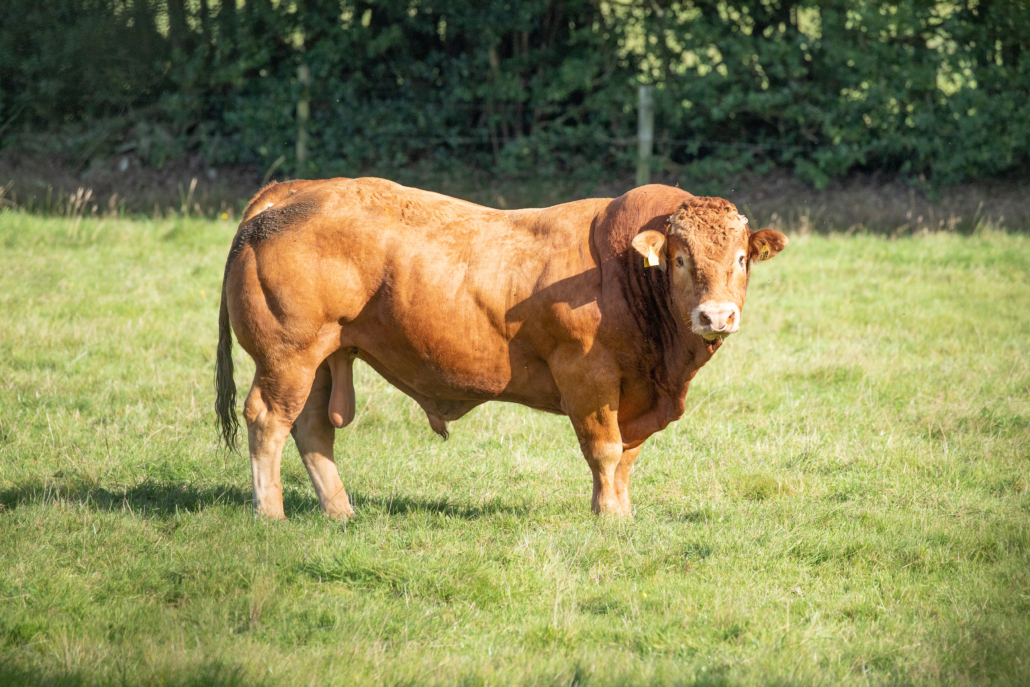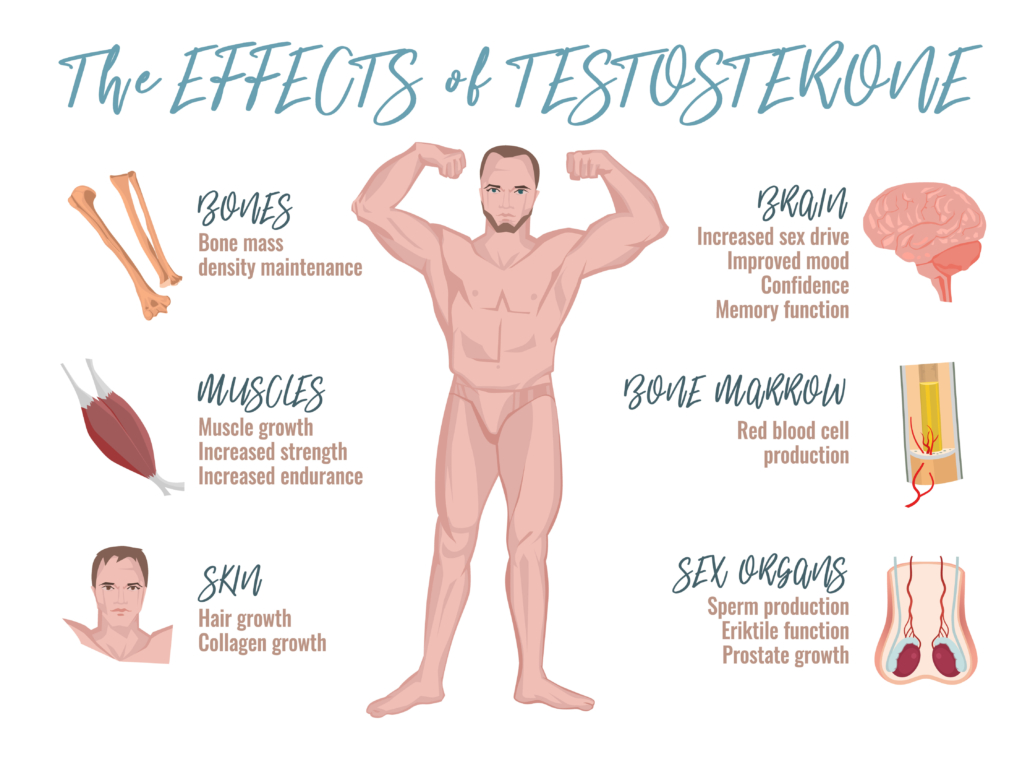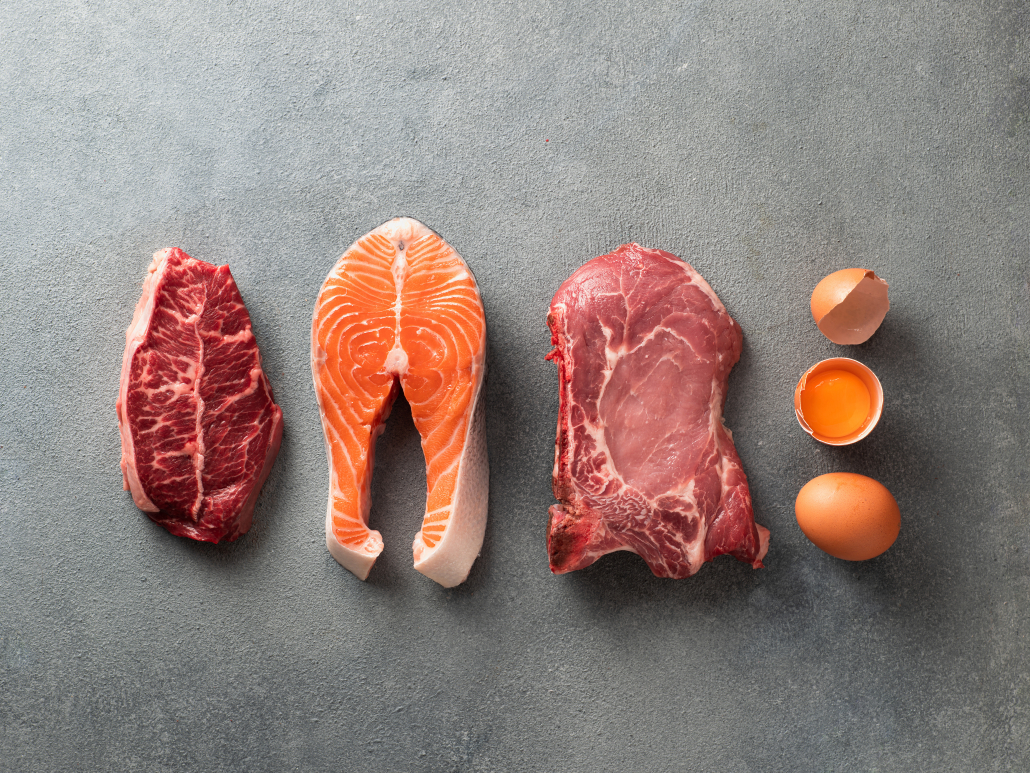We include products in articles we think are useful for our readers. If you buy products or services through links on our website, we may earn a small commission.
How Does the Carnivore Diet Affect Testosterone?

Thousands of people have turned to the all-meat carnivore diet as a way to take control of their metabolic health. One of the keys to the health benefits of the carnivore diet is how it improves hormone synthesis and balance. This is especially true for testosterone, the most important hormone for men.
In this article, we’ll look at the science and the foods behind how a carnivore diet can improve testosterone levels.
Table of Contents
What is the Carnivore Diet?
The carnivore diet entails eating only animal products.
This way of eating is a radical departure from the high-carb standard American diet based on inflammatory foods and compounds, including sugar, grains, vegetable oils, and plant toxins.
Carnivore dieters support this approach by pointing to both their personal experiences and to a large body of evidence strongly suggesting that humans evolved as hyper-carnivorous apex predators for nearly 2 million years.
From this historical perspective, the carnivore diet re-aligns our physiology with the ancestral foods our bodies are designed to thrive on.
And for men having proper testosterone levels is a key to thriving.
What is Testosterone?
Testosterone is a hormone that plays a vital role in men’s health. Key functions of testosterone include :
- Sexual development: testosterone is responsible for the development of male sexual characteristics, such as deep voice and facial hair, and it also regulates sex drive and function
- Supports physical performance by helping to build muscle mass and increase strength
- Bone density: testosterone helps maintain strong bones and prevent osteoporosis
- Increases red blood cell count, which can improve oxygen delivery and athletic performance
- Linked to increased energy, mood, and overall well-being
- Plays a crucial role in sperm production and male fertility

How Does the Carnivore Diet Affect Testosterone?
One of the most persistent claims by carnivore dieters is that it increases testosterone levels.
The testosterone-boosting feature of the carnivore diet is especially important for older men, as testosterone levels decline with age.
Though there haven’t been any studies specifically looking at the effects of the carnivore diet on testosterone, we can extrapolate from studies on the keto diet.
More Animal Fat, More Testosterone
Like keto, the carnivore diet is high-fat, moderate protein, and extremely low carb.
One study compared the effects of a keto diet with a standard Western diet. Researchers found that the keto diet dramatically increased testosterone to 118 ng/dl, compared to the -36 ng/dl decline in testosterone for the standard Western diet group.
Since humans can only get 35% of calories from protein, on a low-carb carnivore diet, the rest of your calories must come from fat.
Studies show that more dietary fats increase testosterone.
A systematic review of numerous studies found that low-fat diets are associated with lower levels of testosterone compared to higher-fat diets.
In one study, researchers divided 43 participants aged 19-56 into two groups. The first group got 41% of their calories from fat, mostly saturated. The second group got only 19% of their calories from fat–mostly Partially Unsaturated Fatty Acids (PUFA) from vegetable oils. The total amount of calories and protein was the same for both groups.
After ten weeks, the higher fat group had 13% higher testosterone levels.5 These results were consistent with an early study on men in Finland.
Getting 41% of your calories from fat is far less than the 70-80% required by a carnivore diet. It’s likely that on the higher fat diet, testosterone increases would be even more substantial–see the study reference above.
Increases Sex Boosting Nutrients
A carnivore diet is loaded with proven testosterone-boosting nutrients like zinc, B vitamins, and vitamin D.
Zinc
Zinc has been shown to increase testosterone levels and improve sperm quality naturally.
Many staple carnivore diet foods are among the most abundant sources of zinc on earth.
High levels of zinc are found in
Vitamin B12
Low levels of B12 are associated with decreased testosterone, higher rates of sexual dysfunction, and premature ejaculation.
This is another area where carnivore diet foods provide an incredible abundance of vitamin B. Take these common carnivore foods as an example:
- Ribeye steak has well over 200% of your RDV of vitamin B 12 per serving
- 100 grams of clams provides 4125% RDV of B12
- 100 grams of beef liver provide 3458% RDV of B12
Vitamin D
Studies show that vitamin D increases testosterone levels in men. And though men with normal levels of testosterone may not see large increases due to vitamin D, it is critical for men with low T to achieve normal levels.
Vitamin D deficiency has also been linked to erectile function, lower orgasmic function, and lower sexual desire.
On a carnivore diet, you get vitamin D from
- pasture-raised pork
- full-fat dairy
- seafood, including oysters and fatty fish.
Reverses Underlying Conditions Affecting Sex Drive
The carnivore diet also supports healthy testosterone levels by combating underlying health conditions that lower testosterone, including:
- Obesity: excess fat can increase levels of aromatase, an enzyme that converts testosterone into estrogen
- Type 2 diabetes: high blood sugar levels can decrease testosterone production
- Chronic inflammation:
- Metabolic syndrome: Associated with decreased libido, hypogonadism, and erectile dysfunction.
The carnivore diet addresses these issues by eliminating highly inflammatory and metabolically hazardous foods, including vegetable oils, sugar, grains, irritating fiber, and plant toxins and antinutrients.
A 2011 study on men with metabolic syndrome found that after just twelve weeks on a low-carb, high-fat diet, markers of metabolic syndrome had been resolved for all participants.
Testosterone Boosting Carnivore Diet Foods

Some foods that have been shown to increase testosterone levels include:
- Oysters: rich in zinc, which helps increase testosterone production
- Eggs: contain cholesterol, a building block of testosterone
- Fatty fish: high in omega-3 fatty acids, which may increase testosterone levels
- Beef and other red meats: contain zinc, iron, and B vitamins, all of which can help increase testosterone levels
Carnivore Diet and Testosterone: The Bottom Line
The carnivore diet eliminates foods that reduce testosterone levels and increases the intake of nutrient-dense foods that support testosterone levels in men.
To date, there haven’t been any studies looking directly at the links between the carnivore diet and testosterone.
However, numerous anecdotal reports, along with research into low-fat, high-carb diets, suggest that the carnivore diet may have powerful beneficial effects on testosterone levels.
The testosterone-boosting benefits of a carnivore diet are likely attributable to the following factors:
- Increasing fat intake–raises levels of testosterone
- Increasing concentrations of vitamins crucial to testosterone production
- Eliminating inflammatory foods like sugar, grains, vegetable oils, fiber, and plant toxins
If you’re looking for a way to dive right into an animal-based diet, try Dr. Kiltz’s BEBBIIS plan. It centers on fatty steak and includes a variety of nourishing animal products like duck liver, blue cheese, and homemade ice cream.
Explore more carnivore diet menus, meal plans, and shopping lists here.





















